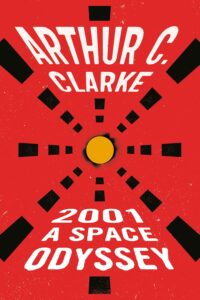Welcome to my first monthly book recommendation! On the first day of each month, I’ll recommend a book, new or old, fiction or nonfiction, pulled from my own reading experience. In my recommendation, I’ll introduce the book, discuss why I found reading it worthwhile, and what major themes the book touches upon. I won’t include any major spoilers, but I may discuss some of the characters and specific details or locations from within the book. My recommendation for March 2024 is 2001, A Space Odyssey.
2001, A Space Odyssey
Available on Amazon
Author: Arthur C. Clarke
Genres: Science Fiction, Speculative Fiction
Description:
From the savannas of Africa at the dawn of mankind to the rings of Saturn as man ventures to the outer rim of our solar system, 2001: A Space Odyssey is a journey unlike any other.
This allegory about humanity’s exploration of the universe—and the universe’s reaction to humanity—is a hallmark achievement in storytelling that follows the crew of the spacecraft Discovery as they embark on a mission to Saturn. Their vessel is controlled by HAL 9000, an artificially intelligent supercomputer capable of the highest level of cognitive functioning that rivals—and perhaps threatens—the human mind.
Grappling with space exploration, the perils of technology, and the limits of human power, 2001: A Space Odyssey continues to be an enduring classic of cinematic scope.
My Thoughts on This Book
Most people know of 2001, A Space Odyssey from the classic 60s’ movie. The movie and book were actually written concurrently, unlike most situations where one comes before the other. There are differences between the two, such as the use of Jupiter vs Saturn as the primary location for one of the events, but all of the major events and characters persist. The book and the movie both have a sequel, and beyond that, there are two more books, the last of which is set far into the future. In my opinion, all the books in the series are worth reading, but this book is by far the best one.
The book touches upon themes relating to humanity and its role in the universe. When evidence of alien life is found, the United States government secretively invests substantial amounts of money and man-power to investigate further, creating cutting edge outer-space and AI technology in the process. This mission to the outer reaches of the solar system, so important to humanity, is kept secret from the majority of humanity. This secretiveness, and the surrounding politics, play a substantial role in the development of events later in the book, especially where the artificial intelligence HAL is concerned.
Throughout the space voyage, we are constantly reminded of the loneliness of space, more so in the book than in the movie. The spaceship is quiet, slow moving, and millions of miles away from Earth. Yet, the isolation these astronauts felt isn’t a new phenomenon. Loneliness is something everyone experiences, some far more than others. In my opinion, the drive to meet this alien life is analogous to the yearning to feel belonging, to felt looked-after, and the risks that come with reaching out to others to make this a reality. With that loneliness, both in the book and in reality, is a hope that the work and efforts we put into our own goals, relationships, and lives will pay-off in the end, that it will all be worth it.
On of my favorite aspects of this book is its pacing. It perfectly fits the definition of a slow burn, a story that slowly evolves, gradually building and building on the tension as the characters slowly navigate their way through the world. The majority of the book is set in a small spaceship slowly moving through outer space, relying on the gravity of moons and planets to do so. As the distance from Earth increases, so too does the danger. Every character must navigate through these dangers with the utmost deliberation and caution. Everything they do must be precisely calculated and weighed against the risks. The smallest of actions can save or doom the most important mission humanity has ever embarked upon.
It almost emerges from the book itself. As I was reading, I felt the quietness of the room I was sitting in, combined with the magnification of the smallest of sounds, such as my fingers rubbing against the paper as I turn the page, put me in their shoes: an astronaut far away from Earth in the silence of isolation.
Overall, my experience with this book was very unique and rewarding, which is why it is my monthly book recommendation for March 2024. If you’d like to check it out for yourself, it’s available in print and ebook formats on Amazon.
